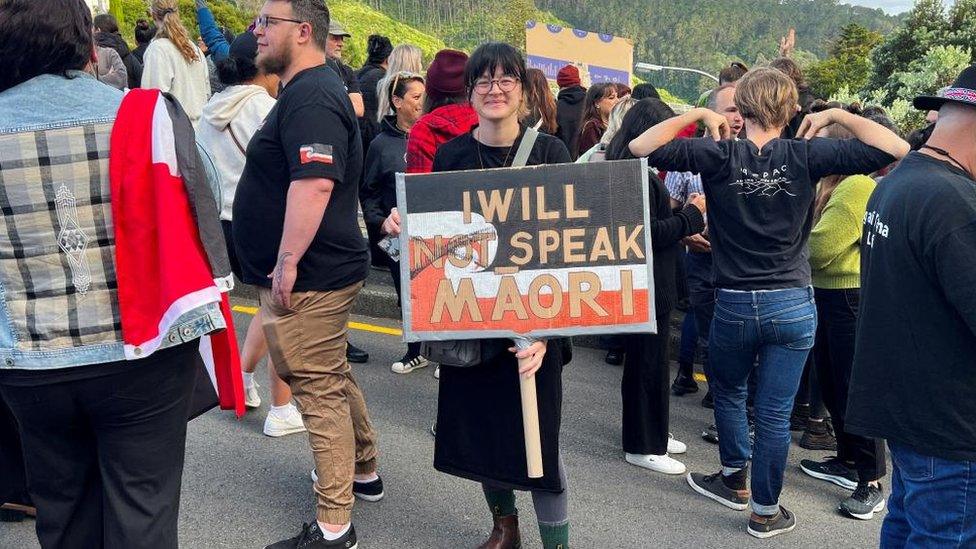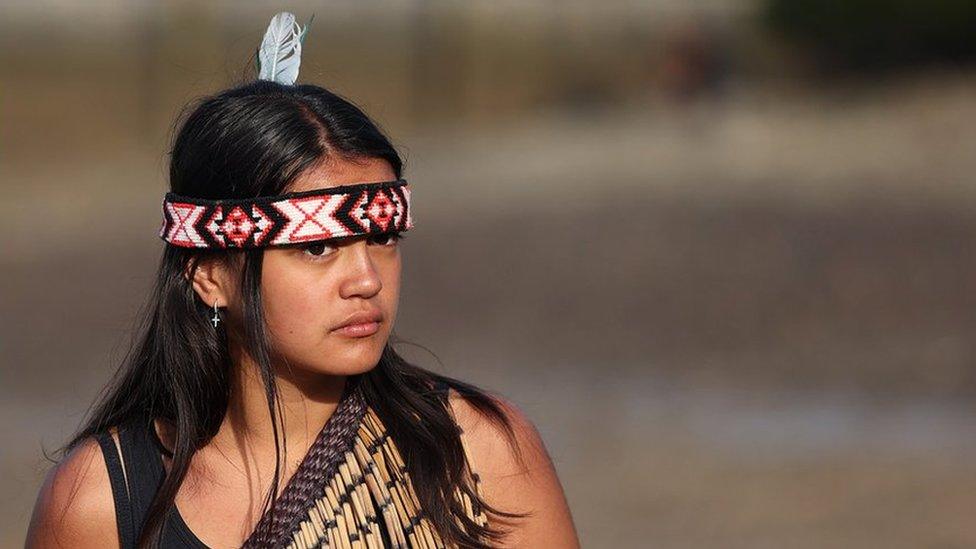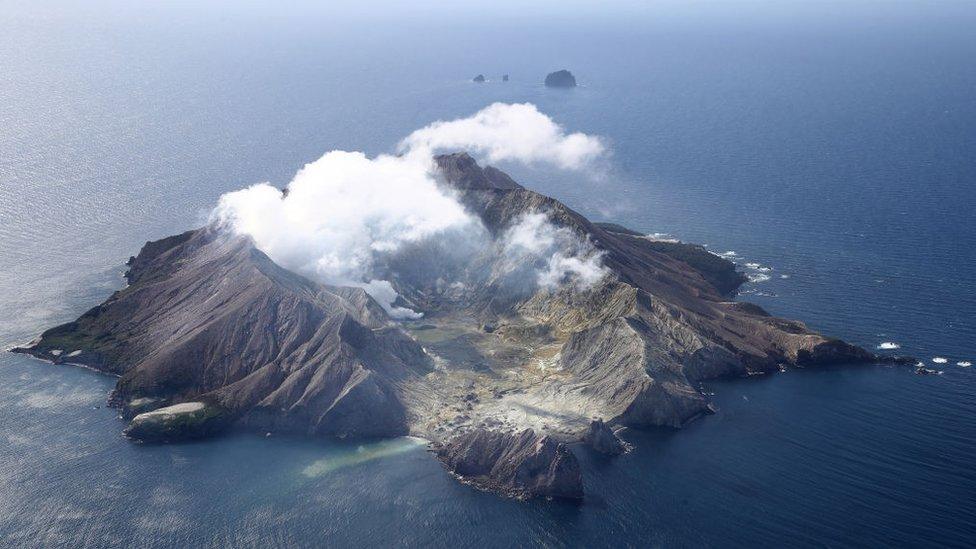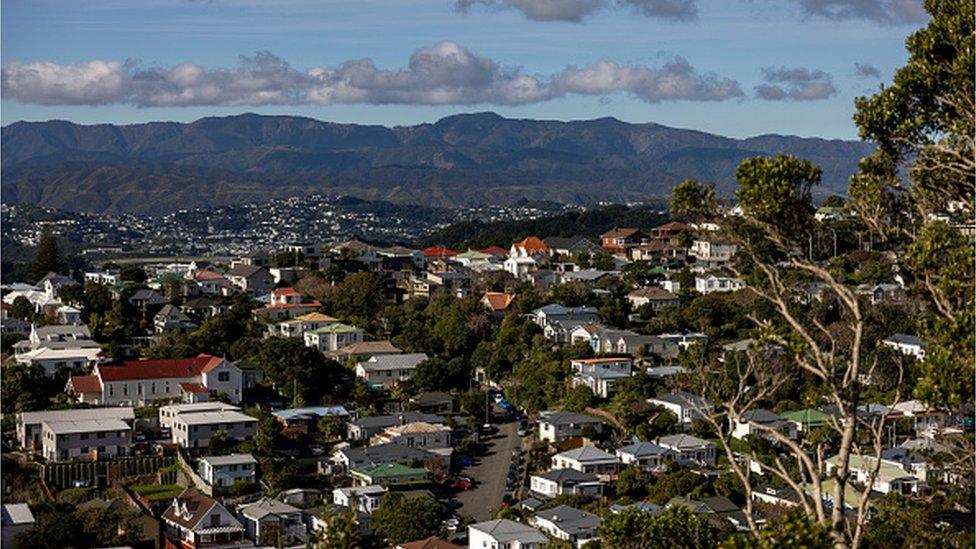New Zealand: Thousands march against new government's reversal of Indigenous policies
- Published

Māori leaders have accused Prime Minister Chris Luxon's conservative government of being "anti-Māori"
Thousands of protesters across New Zealand have rallied against the new government's plans to reverse policies which boosted Indigenous rights.
Prime Minister Chris Luxon's right-wing government wants to re-interpret the nation's Indigenous treaty and roll back use of Māori language.
Māori leaders have accused the three-party coalition of being "anti-Māori".
But the government has said it is committed to improvements "for Māori and non-Māori".
The new governing coalition's leaders have said they do not wish to divide the country along race, and have called for a review of affirmative action policies.
Tuesday's protests involved about 300 cars clogging roads in Auckland, where two people were arrested.
Demonstrators also took to the streets in Wellington and several other cities.
The protests - called for by the leaders of the Maori political party - came on the first day of parliament's sitting since October's election.
The centre-right National party won the majority vote but under New Zealand's electoral system required the support of two minor right-wing parties, New Zealand First and Act, to form a government.
Watch: Maori MP performs haka before swearing oath to King
The governing coalition was only sworn in last week after over a month of policy negotiations, with analysts saying the fringe parties have pushed National to the right.
"People may project onto us a whole range of things, and me personally," Mr Luxon said. "My job is to model out what I want to see in this country: more unity, everyone doing well, and improved outcomes."
Many in the Māori community have been angered by plans to reinterpret the principles of the Treaty of Waitangi, New Zealand's 180-year-old founding document.
The treaty, signed by British colonists and Māori chiefs, is the country's chief document which sets out the rights of Maori, allocation of resources and recognition of political power.
Previous progressive government's interpretations of its principles have also led the country along a path of grappling with the harm of colonisation - an advance some of the new governing leaders said had gone too far, during election campaigning.
The new government has already announced it plans to close the Māori Health Authority, Te Aka Whai Ora, set up during Jacinda Ardern's Labour government and switch the names of some departments from Māori to English.
Last week, it also announced plans to scrap the nation's world-leading smoking ban to fund income tax cuts. Health experts have overwhelmingly criticised the move, which they said would be detrimental to Māori, which have higher smoking rates than the general population.
A national Māori health organisation, Hāpai Te Hauora, called it an "unconscionable blow to the health and wellbeing of all New Zealanders".
The Māori population remains disadvantaged to the general population when assessed through markers such as health outcomes, household income, education levels and incarceration and mortality rates. There remains a seven-year gap in life expectancy.
Rawiri Waititi, co-leader of New Zealand's Te Pāti Māori Party, said on Tuesday that the new government's policies take New Zealand "back to the 1800s." Te Pāti Māori Party now holds six of the 123 seats in Parliament.
"Our protest this morning was an activation of our people," Mr Waititi said.
Former Prime Minister Chris Hipkins has also criticised the reversals, saying Maori progress "is certainly going backwards by three or four decades".
Critics have also express dismay over the new government's plan to reverse landmark environmental and safety laws enacted under Ms Ardern's two terms in government.
The new government says it plans to reverse a ban on offshore gas and oil exploration and also rewrite firearms legislation - which was beefed up after the Christchurch terrorist attack by a white supremacist in 2019, which killed 51 Muslim worshippers.
Related topics
- Published27 November 2023

- Published13 October 2023

- Published15 November 2023

- Published31 October 2023

- Published20 October 2023
